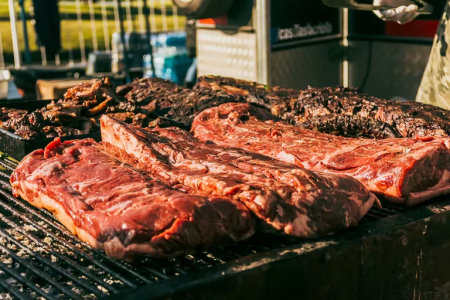All the Answers
Well-known member
Less roast, fewer bottles: in the first part of the year, meat consumption and also wine consumption fell sharply - Infobae

Source:

Menos asado, menos botellas: en la primera parte del cayó fuerte el consumo de carne y también de vino
Las estadísticas marcan una baja del 8,2% en las ventas de cortes vacunos y una retracción del 4,4% en la comercialización de productos vínicos
April 03, 2024
The statistics show a drop of 8.2% in sales of beef cuts and a decline of 4.4% in the marketing of wine products.

In the first two months of the year, meat had a contraction of 8.2% year-on-year
Although they are part of the Sunday table of all Argentines, neither barbecue "asado" nor wine are considered essential products and statistics show this. According to data published by official organizations, consumption of both products plummeted during the first two months of the year.
When it comes to meat, the numbers are clear. According to the Chamber of Industry and Commerce of Meat and Derivatives of the Argentine Republic (Ciccra) , in the period January-February 2024, beef consumption was 349.1 thousand tons r/c/h (tons of beef with bone) and experienced a contraction of 8.2% year-on-year (-31.4 thousand tons r/c/h).
“In the first two months of the year, the beef meat processing industry produced a total of 504 thousand tons r/c/h of meat. This represented a decrease of 8.1 thousand tons r/c/h in relation to the first two months of last year,” they explained.
"Meanwhile, if beef exports remained around 78 thousand tons r/c/h in February, as happened in recent months, in the accumulated of the first two months of the year 155.2 thousand would have been exported. tn r/c/h and an increase of 17.6% annually (+23.2 thousand tn r/c/h) would have been observed. In these figures we exclude shipments of bones with meat to China, as we have been doing since last year. But we highlight the issue, because it recently became public, when the Ministry of Agriculture announced the review of the export series and, consequently, of apparent consumption," they continued.
From all this, Ciccra affirms, the aforementioned drop of 3.8% in the first two months of the year can be deduced. The positive data, beyond the decrease in the first two months, is that the moving average of the last twelve months of beef consumption was 51.7 kg/inhabitant/year in February 2024, being just 0.1 % below the average for February 2023.

Wine, also on the decline
In short, less meat was consumed in the first two months, but even so the level of consumption is close to the historical average.
The wine market falls
According to statistics published by the National Institute of Viticulture (INV) , in the first two months of the year, total wine consumption fell 4.4% in Argentina. In detail, during the first two months of last year, 104.5 million liters of wine were consumed in the country, while in the same period this year 99.9 million were shipped (4.6 million less).The most significant drop occurred in the traditional 750 cm3 bottles. The numbers published by the organization indicate that wine sales in that format fell 8.6% year-on-year in the first two months of the year, which explains 3.7 of the 4.6 million that were stopped being consumed.
The first two months were also negative for the sale of wine in 1,500 cm3 bottles (-0.7%), in Tetra Brik (-0.3%), in demijohns (-30.5%) and in cans (-44 .7%), among other formats.
General consumption falls
Although in this case the magnifying glass was put on meat and wine, the truth is that the drop in consumption is repeated in many products. According to a report by the consulting firm Focus Market, in February of this year mass consumption showed a decline of 13.4% year-on-year and 6.6% compared to January.“The number of tickets fell 3.4% compared to the previous week and 11.4% compared to last year,” they stated.
“The loss of purchasing power of Argentines' income continues to be the order of the day. Although in February the prices of mass consumption goods rise to a level lower than what they had been registering in the previous month, they are still well above the possibilities of access by Argentines,” indicated Damián Di Pace , director of the consultant.

